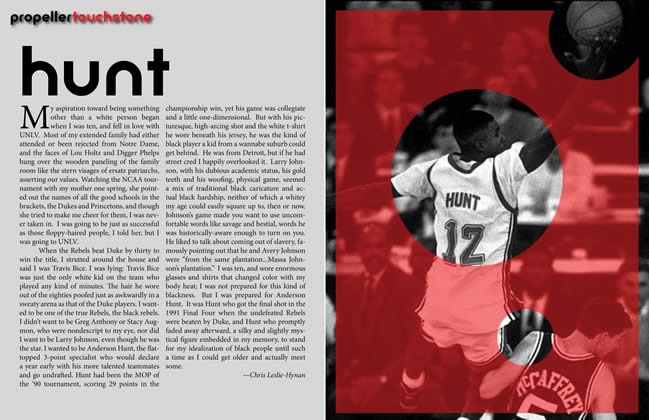
My aspiration toward being something other than a white person began when I was ten, and fell in love with UNLV. Most of my extended family had either attended or been rejected from Notre Dame, and the faces of Lou Holtz and Digger Phelps hung over the wooden paneling of the family room like the stern visages of ersatz patriarchs, asserting our values. Watching the NCAA tournament with my mother one spring, she pointed out the names of all the good schools in the brackets, the Dukes and Princetons, and though she tried to make me cheer for them, I was never taken in. I was going to be just as successful as those floppy-haired people, I told her, but I was going to UNLV.
When the Rebels beat Duke by thirty to win the title, I strutted around the house and said I was Travis Bice. I was lying: Travis Bice was just the only white kid on the team who played any kind of minutes. The hair he wore out of the eighties poofed just as awkwardly in a sweaty arena as that of the Duke players. I wanted to be one of the true Rebels, the black rebels. I didn't want to be Greg Anthony or Stacy Augmon, who were nondescript to my eye, nor did I want to be Larry Johnson, even though he was the star. I wanted to be Anderson Hunt, the flat-topped 3-point specialist who would declare a year early with his more talented teammates and go undrafted. Hunt had been the MOP of the '90 tournament, scoring 29 points in the championship win, yet his game was collegiate and a little one-dimensional. But with his picturesque, high-arcing shot and the white t-shirt he wore beneath his jersey, he was the kind of black player a kid from a wannabe suburb could get behind. He was from Detroit, but if he had street cred I happily overlooked it. Larry Johnson, with his dubious academic status, his gold teeth and his woofing, physical game, seemed a mix of traditional black caricature and actual black hardship, neither of which a whitey my age could easily square up to, then or now. Johnson's game made you want to use uncomfortable words like savage and bestial, words he was historically-aware enough to turn on you. He liked to talk about coming out of slavery, famously pointing out that he and Avery Johnson were "from the same plantation...Massa Johnson’s plantation." I was ten, and wore enormous glasses and shirts that changed color with my body heat; I was not prepared for this kind of blackness. But I was prepared for Anderson Hunt. It was Hunt who got the final shot in the 1991 Final Four when the undefeated Rebels were beaten by Duke, and Hunt who promptly faded away afterward, a silky and slightly mystical figure embedded in my memory, to stand for my idealization of black people until such a time as I could get older and actually meet some. —Chris Leslie-Hynan
Chris Leslie-Hynan is a graduate of the Iowa Writers Workshop and lives in Portland, Oregon.


